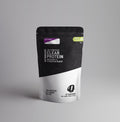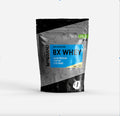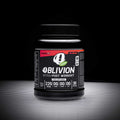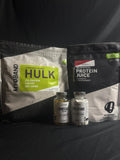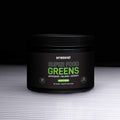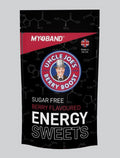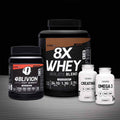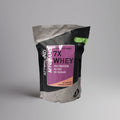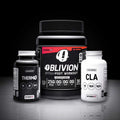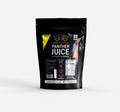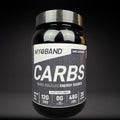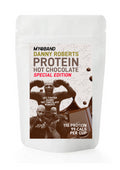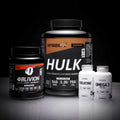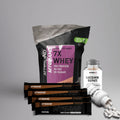Will adopting a vegan diet hinder athletic performance?
Posted by LIAM KINGSWELL

What is a vegan diet?
The vegan diet has become extremely popular over the last few years with celebrities such as Lizzo, Jared Leto and Miley Cyrus adopting veganism. Many are vegan for a variety of motives. Some environmental for the sake of animal welfare and others simply to adopt a healthier lifestyle that the right vegan diet can provide.
What is it you cannot eat with a vegan diet? Well, it really comes down to just about any animal products. Veganism means excluding consumption of any meat, fish, eggs, or dairy as well as gelatine (animal fat often found in sweets) and often honey. This can also mean avoiding certain beverages that have been filtered through gelatine or casein from milk. This is technically not the same as a ‘plant-based diet’ which contains mostly but not exclusively plant-based foods. Plant based products however are all considered vegan.
While interest for the vegan diet continues to grow, more research is being put into the effects the vegan diet can have on athletic performance. Body builders such as Kenneth Williams, iron man triathletes like Brendan Brazier and marathon record setters such as Fiona Oaks prove that optimum athletic performance can still be achieved with a vegan diet. Let’s take a dive into some of the nutrients that can be assessed.
What about protein?
Protein is an essential part of the diet, especially when it comes to achieving your optimum athletic performance. Varying amounts and combinations of 20 amino acids makes up the building blocks for protein in the human body, 9 of which we must obtain through our diet to enhance muscle growth and repair to improve athletic performance (Wu, 2009). Those who regularly want to achieve optimum physical performance are recommended 1.3g – 1.8g /kg/day going up to as high at 2g depending on periods of high intensity training (Phillips, 2012). This also depends on if the desired effect is gain of lean muscle and loss of visceral fat; high amounts of protein are required if there is a calorie deficit to avoid muscles loss and promote gain (Park, et al., 2013).
Efficient protein therefore allows muscle building and strengthening which is essential for athletic performance for both vegans and non-vegans.
There is, however, a popular opinion that vegans do not receive enough protein from their diet, and for some that may be true. However, this does not have to be the case! The most important thing is to receive all 9 of the essential amino acids:
- Histidine
- Isoleucine
- Leucine
- Lysine
- Methionine
- Phenylalanine
- Threonine
- Tryptophan
- Valine
These are essential as our bodies cannot make them; they must be obtained from the diet. ‘Complete proteins’ contain all 9 of these. Animal products are naturally complete, making it easier as an omnivore to obtain all 9, however this is not unachievable with a vegan diet.
Vegan foods that are complete proteins:
- Soy
- Spirulina
- Buckwheat
- Hemp
- Chia seed
- Quinoa
- Tempeh
- Amaranth
Alternatively, you can achieve all the essentials through a variation of incomplete vegan proteins. Cereals and grains are high in cystine, tryptophan and methionine but contain hardly any lysine, but in reverse, legumes such as peas, peanuts and lentils are high in lysine but low in what the cereals are high in (Lehman, 2020). This as well goes for rice and beans, making it super easy to achieve these amino acids for vegans. A wide range of protein sources is therefore an important part of the vegan diet.
While soy (0.91) still ranked similar to beef (0.92) for its Protein Digestibility Corrected Amino Acid Score, soy is known to have less anabolic effects on muscle than animal products due to the composition of the essential amino acids, particularly the branched chain amino acid valine (Vliet, 2015).
However, a study in 2021 comparing a group consuming high animal protein and another consuming high plant protein had the same anabolic reactions in response to a 12-week endurance training programme (Hevia-Larraín, et al.). This shows indication that it is primarily large amounts of protein rather than where the protein comes from that affects muscle growth and repair.
Branched chain amino acids are known particularly for their ability for muscle growth and repair due to their signalling properties that stimulate muscle synthesis within the body, allowing for strengthening and repair (Matthews, 2005). These can be easily consumed through a vegan diet, the best source being soy protein isolate as well as tofu and pumpkin seeds.
Whilst a range of vegan protein sources can reach high protein levels, supplementation is usually advised, just like it is with non-vegan athletes. Not all types of creatine are vegan but some such as Creatine Monohydrate are totally vegan safe. Vegan protein powders such as Oblivion vegan contain this as well as all 9 of the essential amino acids; this results in 22g of protein per two scoops! Also, convenient branched chain amino acid pills are available, so its super easy. This, as well as a varied vegan diet shows that protein requirements through the vegan diet really can be achieved for the desired athletic performance.
Can you still get enough calcium and vitamin D?
Calcium and vitamin D are crucial for bone health, preventing fractures and stress fractures caused by over use of bone by improving overall bone density (Tenforde, et al., 2010). With regular exertion in physical performance, such injuries can be common amongst athletes so it is important to assure correct amounts of calcium and vitamin D are consumed, for both vegans and non-vegans!
Calcium is the main component of bone, responsible for its growth and strength (Zhu & Prince, 2012). It is usually assumed to only be found in dairy products such as milk and yogurt, but there are vegan sources to! Beans, lentils, leafy greens, and nuts like almonds contain good amounts of calcium and are super easy to incorporate into a vegan diet.
There is also a great deal of foods fortified with calcium available. A cup of fortified orange juice can have as much at 50% of the recommended daily requirements as well as fortified vegan milks containing as much as 30% (Zhao, et al., 2005).
This the same for vitamin D, which is responsible for the absorption of calcium as well as muscle and mitochondrial health and vital for athletic performance. Most of the population is vitamin D deficient, vegan or not, which has led to mass fortification to many products as well as biofortification of crops (Moulas & Vajou, 2018). This is mainly due to lack of sunlight exposure, particularly during the winter.
One study showed there was no negative effects on fracture risk or bone loss in a group of vegans, whereas the non-vegans showed a negative association of bone loss due to high animal lipid intake (Ho-Pham, et al., 2012). Studies have also shown that prebiotic fibres found in fruits and vegetables such as garlic, onions, artichokes, and bananas improve absorption of calcium, all foods that can be found in abundance in a vegan diet (Jakeman, et al., 2016).
Calcium is crucial for a vegan’s athletic performance, particularly weight bearing exercise as well as vitamin D for muscular strength and oxygen utilisation (Rogerson, 2017). However, it is not just vegans who are at risk of deficiency so adopting a vegan diet will not result in any lower levels of these minerals. All athletes should consider incorporating these into their diet as well as proper supplementation for their athletic performance.
What about iron?
Iron is essential, transporting and delivering oxygen round our bodies, and aiding in energy production (Beard, 2001). If deficient, aerobic performance would be massively affected due to decreased delivery of oxygen to skeletal muscle (Sim, et al., 2019). Sufficient iron levels are therefore vital for optimum athletic performance and getting the most out of your workouts.
There seems to be another misconception that iron can only be found via animal meat. Iron comes in two forms, non-haem, which is found in both meat and plants, and haem, found only in meat (Roughead & Hunt, 2000). Non haem iron can be found in high amounts in leafy greens such as kale and spinach as well as some nuts and seeds. Just a cup of lentils or kidney beans provides 37% of the daily value, and if you are a dark chocolate lover 28g (about half small bar!) contains 19% (FoodData Central, 2018). All of which are vegan!
While non-haem iron is not as well absorbed as the iron found in meat, this absorption can be increased. Consuming vegan iron rich foods alongside foods containing ascorbic acid, like citrus foods, juice and or tomatoes you can increase absorption, but making sure to avoid tannins found in tea and coffee which can lower absorption (Hunt, 2003).
You can still incorporate iron into a vegan diet and prevent unnecessary lack of oxygen transport during athletic performance. By just including some of these vegan iron rich food sources alongside some acidic fruits or veg you should get there! If, however you feel an unusual lack of energy, it is easy to incorporate an iron supplement into your diet, this is common even for non-vegans!
Additional advantages to a vegan diet for athletic performance
Antioxidants:
While exercise is extremely beneficial in many ways for our health there can be some disadvantages. Long bouts of intense physical exercise can result in the accumulation of free radicals. These are extremely damaging, causing oxidative stress, damaging muscle, and altering DNA in our cells, leading to mutations (Hudson al., 2008). Part of this also involves diseases such as inflammatory joint disease, which could massively affect athletic performance, potentially leading to suspending exercise altogether (Hadjigogos, 2003).
Now that sounds scary but as well as exercise induced oxidative stress, this is just part of our body’s normal metabolic process; that is why we have antioxidants! They prevent or at least reduce the damaging effects of free radicals, therefore preventing adverse effects on physical performance. The best news is the vegan diet is full of them, particularly vitamin C and E which are both powerful antioxidants.
While the body can make its own antioxidants, vitamin E and C can be obtained through the diet allowing for better prevention of damage. Vitamin C can be found in certain organ meats like liver and vitamin E can be found in that fats and oils of animal products, but they are found in their highest amounts in fruits and vegetables (García-Closas, et al., 2004). The vegan diet is naturally extremely high in fruit and veg so vegans will usually obtain more of these antioxidants. Polyphenols are compounds also found naturally in abundance in fruit and vegetables, these also indirectly act as antioxidants (Weikert, et al., 2020).
A variety of other antioxidants are naturally abundant in fruit and vegetables. Their protective roles mean it has become common for athletes to consume many different antioxidant supplements to fight against fatigue, muscle damage and enhance athletic performance (Merry & Ristow, 2016). However, the vegan diet naturally offers extremely high natural amounts. Vegans will usually get a wider range of antioxidants due to overall higher intake in fruit and vegetables as well as a larger variety than omnivores (Fuhrman & Ferreri, 2010).
Collagen:
Vitamin C is also important in the synthesis of collagen in our bodies as well as iron absorption (Grosso, et al., 2013). Collagen is essential for optimum athletic performance. It’s fibrous like structure makes up the tendons in our bodies. Having enough collagen prevents stiffness and therefore presents a lower risk of injury during athletic performance (Marturano, et al., 2013). This is essential for not only improvement of mobility during athletic performance but also for avoidance of injury that could suspend training. Large amounts of vitamin C for collagen synthesis can be easily achieved through a vegan diet. For a little extra, supplement collagen pills are also available, also containing vitamin C as seen in MYOBANDS lab series.
Carbohydrates:
As with additional fruit and vegetables that come with a vegan diet, vegans will usually naturally obtain and benefit form a diet high in carbohydrates. Diets high in carbohydrates are common with endurance athletes for a high source of energy, increasing duration of athletic performance (Baroni, et al., 2023).
High amounts of carbohydrates seen in a vegan diet can also aid in recovery. Ensuring the restock of muscle and liver glycogen (the glucose stored in the body) is what allows for a quicker return to training as this will help in preventing soreness (Burke, et al., 2011). It is important for prolonged athletic performance that there are sufficient stores of glycogen for energy, this can be easily achieved with a vegan diet (Parolin, et al., 1999).
Short bursts of high intensity exercise also rely on metabolic pathways that are started by carbohydrates (Stellingwerff, et al., 2006). A vegan diet natural in carbohydrates can therefor aid in both anaerobic and aerobic athletic performance whilst avoiding fatigue!
General health
There are many health benefits that come with a vegan diet which of course will directly and indirectly affect athletic performance.
We have covered that vegans will naturally have a higher intake in fruit and veg, and the health benefits of that speak for themselves! However now, more specifically, how much this high intake can help with our immune systems. Athletes, in this case endurance athletes, are particularly susceptible to infections, such as in the upper respiratory tract often due to long and intense stresses of exercise (Fuhrman & Ferreri, 2010). Even a short intense workout can shortly compromise immune function, increasing susceptibility to microbial infections, halting training and affecting athletic performance (Tuan, et al., 2008). Immunosuppression can also occur due to a high fat diet, as well as the wrong type of fats (polyunsaturated) contributing to chronic inflammation (Bishop, 1999). The immune system can be enhanced, particularly by carotenoids, a pigment found in yellow, orange, and red fruit and veg and phytochemicals, chemicals compounds produced by plants (Chew & Park, 2004). This just shows how the vegan diet can boost out immune systems to stay fit and healthy to reach our desired athletics performance.
Vegan diets are usually higher in fibre, fruit and veg, as well as being far lower in the intake of saturated fats. This results in less accumulation of plaque in arterial walls lessening the chance of heart disease; some have even claimed that by stopping the consumption of meat that the arterial plaque can be reversed (Esselstyn, 1999). Less thick arterial walls seen in vegans as well as better ventricular systolic and diastolic function may improve overall cardiac output as well as improved haemoglobin concentrations seen in some vegans will massively improve athletic performance (Król et al., 2020). Vegans in general are at a lower risk of hypertension as well as other disease such as diabetes, primarily due to increased fruit, vegetables, and grains rather than animal meat and dairy (Woo, et al., 2014).
Overall
Adopting a vegan diet absolutely does not mean it will hinder your athletic performance. More considerations will need to be accounted for, such as with protein. It is far easier as a meat eater to get your daily allowance of protein, through either meat or dairy products. However, this is totally achievable with a vegan diet. It just takes a bit more careful planning to ensure you are getting enough of all the essential proteins for optimum muscle repair, strength, and recovery. All daily requirements can be met, it just takes a bit more consideration when it comes to a vegan diet, but that does not mean it cannot be done.
Often many will benefit from certain supplements such as iron and vitamin D, but so would everyone else! Vitamins such at B12 will need to be supplemented but as long as those adopting the vegan diet know this, there is no saying the requirements cannot be met.
Being a vegan does not guarantee you are the epitome of health. The rise of veganism means initialisation and sheer market saturation has occurred with ‘meat free versions’ of meat and dairy products. Vegan sausages or mincemeat often are very high in salt and sugar, sometimes even more so than that actual meat counterparts. It is easy to fall into the trap of thinking everything vegan is healthy. A vegan ice cream is still ice cream!!
Desired athletic performance can 100% be achieved with a well thought out vegan diet, there may even be the additional benefits due to appropriate increase of fruit and veg as well as carbohydrates! With any diet, it is important to get all the macro and micronutrients you need to be fit and healthy, and this can very much be done with a vegan diet.
References
Bishop, N. C., Blannin, A. K., Walsh, N. P., Robson, P. J., & Gleeson, M. (1999). Nutritional aspects of immunosuppression in athletes. Sports Medicine, 28, 151-176. https://doi.org/10.2165/00007256-199928030-00002
Burke, L. M., Hawley, J. A., Wong, S. H., & Jeukendrup, A. E. (2011). Carbohydrates for training and competition. Journal of sports sciences, 29(sup1), S17-S27. https://doi.org/10.1080/02640414.2011.585473
Esselstyn, C. B. (1999). Updating a 12-year experience with arrest and reversal therapy for coronary heart disease (an overdue requiem for palliative cardiology). American Journal of Cardiology, 84(3), 339-341. https://doi.org/10.1016/S0002-9149(99)00290-8
Fuhrman, J., & Ferreri, D. M. (2010). Fueling the vegetarian (vegan) athlete. Current sports medicine reports, 9(4), 233-241. https://doi.org/10.1249/JSR.0b013e3181e93a6f
García-Closas, R., Berenguer, A., Tormo, M. J., Sánchez, M. J., Quiros, J. R., Navarro, C., ... & Gonzalez, C. A. (2004). Dietary sources of vitamin C, vitamin E and specific carotenoids in Spain. British Journal of Nutrition, 91(6), 1005-1011. https://doi.org/10.1079/BJN20041130
Grosso, G., Bei, R., Mistretta, A., Marventano, S., Calabrese, G., Masuelli, L., ... & Gazzolo, D. (2013). Effects of vitamin C on health: a review of evidence. Front Biosci (Landmark Ed), 18(3), 1017-1029. https://doi.org/10.2741/4160
Hadjigogos, K. (2003). The role of free radicals in the pathogenesis of rheumatoid arthritis. Panminerva medica, 45(1), 7-13. https://doi.org/10.1046/j.1365-2230.2003.01179.x
Hevia-Larraín, V., Gualano, B., Longobardi, I., Gil, S., Fernandes, A. L., Costa, L. A., ... & Roschel, H. (2021). High-protein plant-based diet versus a protein-matched omnivorous diet to support resistance training adaptations: a comparison between habitual vegans and omnivores. Sports Medicine, 51, 1317-1330. https://doi.org/10.1007/s40279-021-01434-9
Ho-Pham, L. T., Vu, B. Q., Lai, T. Q., Nguyen, N. D., & Nguyen, T. V. (2012). Vegetarianism, bone loss, fracture and vitamin D: a longitudinal study in Asian vegans and non-vegans. European journal of clinical nutrition, 66(1), 75-82. https://doi.org/10.1038/ejcn.2011.131
Hudson, M. B., Hosick, P. A., McCaulley, G. O., Schrieber, L., Wrieden, J., Mcanulty, S. R., ... & Quindry, J. C. (2008). The effect of resistance exercise on humoral markers of oxidative stress. Medicine & Science in Sports & Exercise, 40(3), 542-548. https://doi.org/10.1249/mss.0b013e31815daf89
Hunt, J. R. (2003). Bioavailability of iron, zinc, and other trace minerals from vegetarian diets. The American journal of clinical nutrition, 78(3), 633S-639S. https://doi.org/10.1093/ajcn/78.3.633S
Jakeman, S. A., Henry, C. N., Martin, B. R., McCabe, G. P., McCabe, L. D., Jackson, G. S., ... & Weaver, C. M. (2016). Soluble corn fiber increases bone calcium retention in postmenopausal women in a dose-dependent manner: a randomized crossover trial. The American journal of clinical nutrition, 104(3), 837-843. https://doi.org/10.3945/ajcn.116.132761
Król, W., Price, S., Śliż, D., Parol, D., Konopka, M., Mamcarz, A., ... & Braksator, W. (2020). A vegan athlete’s heart—is it different? Morphology and function in echocardiography. Diagnostics, 10(7), 477. https://doi.org/10.3390/diagnostics10070477
Lehman, S. (2020, September 29). Complete Protein Combinations for Vegans. Verywell Fit. https://www.verywellfit.com/vegan-protein-combinations-2506396
Marturano, J. E., Arena, J. D., Schiller, Z. A., Georgakoudi, I., & Kuo, C. K. (2013). Characterization of mechanical and biochemical properties of developing embryonic tendon. Proceedings of the National Academy of Sciences, 110(16), 6370-6375. https://doi.org/10.1073/pnas.1300135110
Merry, T. L., & Ristow, M. (2016). Do antioxidant supplements interfere with skeletal muscle adaptation to exercise training?. The Journal of physiology, 594(18), 5135-5147. https://doi.org/10.1113/JP270654
Moulas, A. N., & Vaiou, M. (2018). Vitamin D fortification of foods and prospective health outcomes. Journal of biotechnology, 285, 91-101. https://doi.org/10.1016/j.jbiotec.2018.08.010
Park, B. S., Henning, P. C., Grant, S. C., Lee, W. J., Lee, S. R., Arjmandi, B. H., & Kim, J. S. (2013). HMB attenuates muscle loss during sustained energy deficit induced by calorie restriction and endurance exercise. Metabolism, 62(12), 1718-1729. https://doi.org/10.1016/j.metabol.2013.06.005
Parolin, M. L., Chesley, A., Matsos, M. P., Spriet, L. L., Jones, N. L., & Heigenhauser, G. J. (1999). Regulation of skeletal muscle glycogen phosphorylase and PDH during maximal intermittent exercise. American Journal of Physiology-Endocrinology and Metabolism. https://doi.org/10.1152/ajpendo.1999.277.5.E890
Phillips, S. M., & Van Loon, L. J. (2013). Dietary protein for athletes: from requirements to optimum adaptation. Food, Nutrition and Sports Performance III, 37-46. https://doi.org/10.1080/02640414.2011.619204
Rogerson, D. (2017). Vegan diets: practical advice for athletes and exercisers. Journal of the International Society of Sports Nutrition, 14(1), 36. https://doi.org/10.1186/s12970-017-0192-9
Roughead, Z. K., & Hunt, J. R. (2000). Adaptation in iron absorption: iron supplementation reduces nonheme-iron but not heme-iron absorption from food. The American journal of clinical nutrition, 72(4), 982-989. https://doi.org/10.1093/ajcn/72.4.982
Stellingwerff, T., Spriet, L. L., Watt, M. J., Kimber, N. E., Hargreaves, M., Hawley, J. A., & Burke, L. M. (2006). Decreased PDH activation and glycogenolysis during exercise following fat adaptation with carbohydrate restoration. American Journal of Physiology-Endocrinology and Metabolism, 290(2), E380-E388. https://doi.org/10.1152/ajpendo.00268.2005
Tenforde, A. S., Sayres, L. C., Sainani, K. L., & Fredericson, M. (2010). Evaluating the relationship of calcium and vitamin D in the prevention of stress fracture injuries in the young athlete: a review of the literature. Pm&r, 2(10), 945-949. https://doi.org/10.1016/j.pmrj.2010.05.006
Tuan, T. C., Hsu, T. G., Fong, M. C., Hsu, C. F., Tsai, K. K., Lee, C. Y., & Kong, C. W. (2008). Deleterious effects of short-term, high-intensity exercise on immune function: evidence from leucocyte mitochondrial alterations and apoptosis. British journal of sports medicine, 42(1), 11-15.
van Vliet, S., Burd, N. A., & van Loon, L. J. (2015). The skeletal muscle anabolic response to plant-versus animal-based protein consumption. The Journal of nutrition, 145(9), 1981-1991. https://doi.org/10.3945/jn.114.204305
Weikert, C., Trefflich, I., Menzel, J., Obeid, R., Longree, A., Dierkes, J., ... & Abraham, K. (2020). Vitamin and mineral status in a vegan diet. Deutsches Ärzteblatt International, 117(35-36), 575. https://doi.org/10.3238/arztebl.2020.0575
Woo, K. S., Kwok, T. C., & Celermajer, D. S. (2014). Vegan diet, subnormal vitamin B-12 status and cardiovascular health. Nutrients, 6(8), 3259-3273. https://doi.org/10.3390/nu6083259
Wu, G. (2009). Amino acids: metabolism, functions, and nutrition. Amino acids, 37, 1-17. https://doi.org/10.1007/s00726-009-0269-0
Zhao, Y., Martin, B. R., & Weaver, C. M. (2005). Calcium bioavailability of calcium carbonate fortified soymilk is equivalent to cow's milk in young women. The Journal of nutrition, 135(10), 2379-2382. https://doi.org/10.1093/jn/135.10.2379
Zhu, K., & Prince, R. L. (2012). Calcium and bone. Clinical biochemistry, 45(12), 936-942. https://doi.org/10.1016/j.clinbiochem.2012.05.006TAGS:
